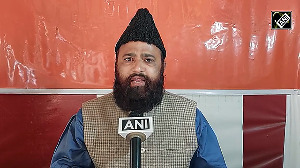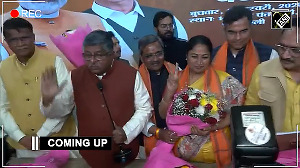The Bush administration has expressed hope that India and Pakistan will find avenues for cooperation despite the postponement of secretary-level talks in the wake of the Mumbai blasts and said the US will continue to encourage the two neighbours to move in that direction.
A senior Bush administration official also refused to put the blame on any individual, group or country for the wave of deadly terror attacks in Mumbai suburban trains last Tuesday that claimed 200 lives and injured over 700 people.
"We certainly hope that the progress in India-Pakistan relations is not lost... I think our outlook remains that India-Pakistan cooperation is important for the region," Assistant Secretary of State for South and Central Asia Richard Boucher told reporters in Washington.
New Delhi postponed the foreign secretary level talks scheduled for July 20 to review the third round of composite dialogue in the wake of Mumbai blasts with New Delhi saying the deadly attack was carried out with help from across the borders.
"Our message to everybody is let us find the evidence. Let us find out who is responsible and then let us work together to see what we can do to stop" individuals or organisations that are behind terrorist activities or support them, he said.
Boucher's comments came hours after Prime Minister Manmohan Singh and US President George W Bush held talks on the sidelines of the G-8 summit in St Petersburg and discussed a wide range of issues, including the Mumbai blasts and the Indo-US civilian nuclear deal.
Terming the Mumbai blasts as a "horrible tragedy" with those responsible being "obviously well prepared" and with "evil intent", Boucher said Washington is looking forward to seeing "how the evidence develops".
"I know there is a lot of speculation...We have to be led by evidence," he said.
Addressing reporters on the eve of the first anniversary of the meeting between Dr Singh and Bush that clinched the historic deal, Boucher said a lot of progress has been made in the relationship between the two countries, including the quick movement on the Indo-US civilian nuclear agreement.
He said Congress has been supportive of the deal and the administration is looking forward to votes in the House and the Senate. He said the deal was "on track".
Though "hesitant" to put a time frame on the legislative process to clear the nuclear deal, Boucher said he expected the House of Representatives to take up the matter in about a week and the Senate shortly thereafter.
The Conference Committee will meet at the end of the August recess with the final movement on the legislation taking place sometime after this period.
Boucher said that it was "conceivable" that the full process would be out of the way by the end of 2006.






 © 2025
© 2025